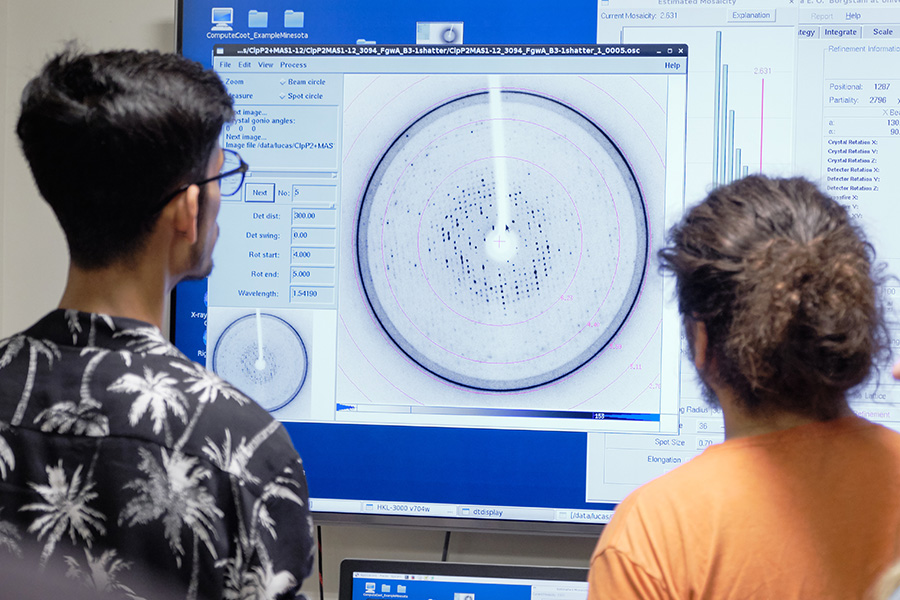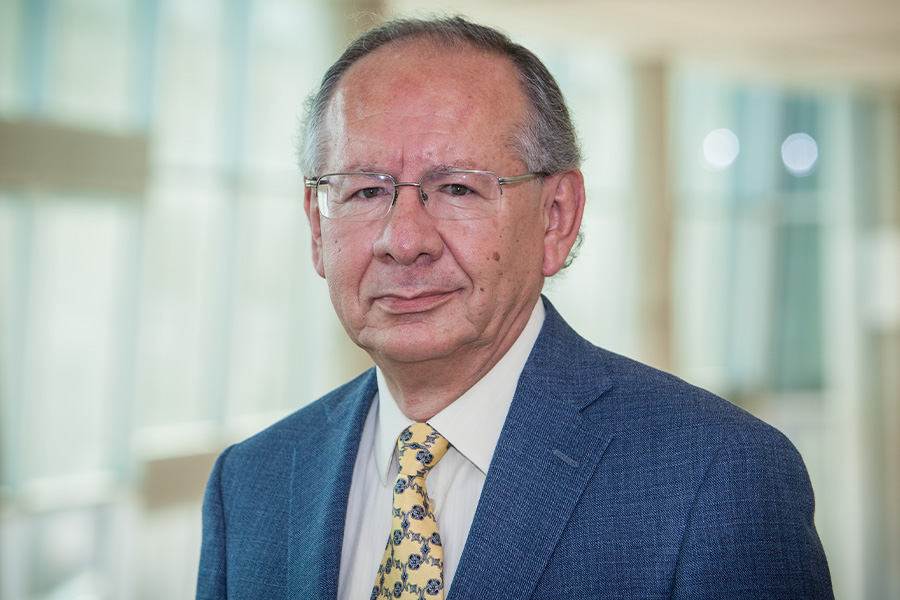Structural Biology & Molecular Biophysics Training Program

Unlock the mysteries of life's building blocks while gaining key teaching skills to make a lasting impact on the world.
Our cutting-edge, advanced Structural Biology and Molecular Biophysics Training Program offers you the opportunity to dive deep into the atomic world of life's building blocks while also building up valuable teaching skills.
You will play a hands-on role in both basic science projects, which delve into the building blocks of life's big molecules, and translational projects like designing drugs based on molecular structures. Plus, you'll receive training in teaching, both online and in person.
Our state-of-the-art facilities and world-renowned faculty provide you with the tools and resources needed to push the boundaries of structural biology and molecular biophysics.
The program is highly competitive and trains only five or six graduate students each year. Support is provided by a grant from the U.S. Department of Education’s Graduate Assistance in Areas of National Need (GAANN) program.
Students in the program will receive advanced training on top of their doctoral program requirements. Our goal is to produce a diverse group of outstanding researcher-teachers with excellent communication skills and technical expertise that will become the next generation of faculty in structural biology and molecular biophysics.
You will be trained in the specific structural biology and molecular biophysics technologies required by your doctoral thesis project, as well as teaching techniques and best practices for both online and in-person classrooms. You'll also receive training in communication, project management and leadership skills.
Our program emphasizes experiential learning, giving you the opportunity to conduct groundbreaking research that contributes to our understanding of complex biological systems. You’ll also gain proficiency in techniques such as X-ray crystallography, nuclear magnetic resonance spectroscopy and cryo-electron microscopy.
Training will consist of:
- Formal courses
- Journal clubs
- Seminars
- Mentored research leading to a doctoral thesis and degree
As a member of the training program, you'll receive financial support, including:
- Yearly stipend of $33,000
- Tuition and fees waived
- Medical insurance
- Research supplies
Plus, in addition to getting real-world experience, you will:
- Prepare for research-intensive careers with a focus on teaching in higher education.
- Gain transferable skills, like communication and leadership, that are crucial to success regardless of career path.
- Stand out in today's competitive scientific landscape and strengthen your credibility for future training grant and fellowship funding.
- Build your CV through publications and presentations.
- Network with a cohort of students, faculty members and peer advisors, forming connections for future collaborations and job opportunities.
The program is highly competitive and trains only five or six graduate students each year. Candidates are typically in their second or third year of study and must be:
- U.S. citizens or permanent residents
- PhD graduate students in an associated UNMC doctoral program
Candidates must also have:
- Completed lab rotations and selected an advisor
- Structural biology and molecular biophysics methods as a major component of their doctoral thesis research
Note: Preference is given to students who have already passed their comprehensive exam.
Fellowships are awarded on a competitive basis. The application period is every three years (sometimes annually if a slot becomes available).
To apply, you need to submit a:
- One-page, single-spaced, research summary of your doctoral work that includes structural biology and molecular biophysics as a major component.
- Unofficial transcript of your undergraduate and graduate coursework.
- List of your current and pending support (e.g., fellowship applications; grants awarded to primary thesis advisor, etc.).
- List of your publications (published or in press), presentations (talks or posters) and any awards.
- Letter of reference from your primary thesis advisor that includes a brief description of the SBMB research component.
Email Dr. Gloria Borgstahl with any questions.
Meet the Team
Directors
Gloria Borgstahl, PhD
Professor, Eppley Institute
Co-Director, Eppley Structural Biology Facility

Luis A. Marky, PhD
Professor, Department of Pharmaceutical Sciences
Director, Pharmaceutical Sciences Graduate Program

